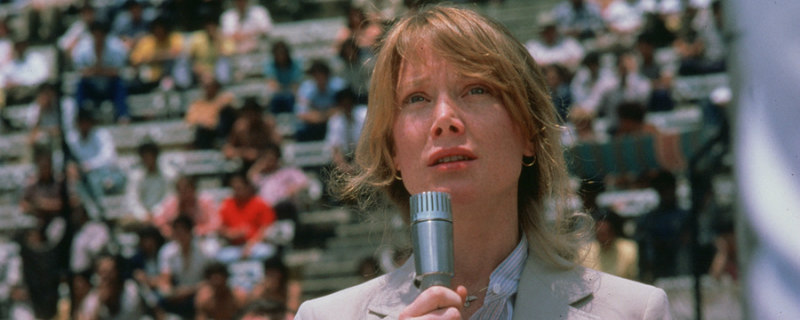
Review by Jason Abbey
Directed by: Costa-Gavras
Starring: Jack Lemmon, Sissy Spacek, Melanie Mayron, John Shea, Charles Cioffi, David Clennon

Missing fits into that particularly dicey sub category of the docu-drama genre in which the political turmoil of a country (in this instance the coup that deposed democratically elected Chilean President Salvador Allende) is seen through the eyes of American interlopers.
What saves it from being war tourism is the fact that the film is a true story and also that the United States in this instance played a major part in installing a dictator to protect American financial interests.


The missing American journalist Charles Horman (John Shea) may be somewhat naïve, searching for a better way of life and becoming politically engaged as events turn from tumultuous to deadly, but this is no polemic and Costa-Gavras seamlessly intertwines the political with the personal. It doesn't hold you by the hand and give you a brief outline of the facts, but rather does that all too rare thing in cinema and asks you to keep up.
In many ways, Missing is a detective story about a ghost, focussed on two absolutely barn storming performance by Jack Lemmon (never better) as Edmund, the father of Charles, and Sissy Spacek as a fragile but oh so very mentally strong Beth, dealing with both the grief of uncertainty regarding her husband and with a father who appears to have little empathy or understanding of his own son.
Lemmon is the masterstroke here, one of cinema's most likeable everyman schlubs portraying an at first borderline unlikeable character, a man of steadfast moral and religious fibre with a Manichean hold on the ideals of the U S of A. His certainty gradually crumbles to reveal a complex, uncertain but emboldened man who slowly learns to love his son, and Lemmon's is perhaps one of the finest performances of the 1980s.


As the film plays out, its detective story is not just about finding a missing person but about piecing together the personality of an estranged son. Edmund arrives initially to pick up his son as though he has been arrested after an all-night keg party, his deference to those in power complete. The fact he may be dead never crosses his mind. Each step in his investigation reveals both more of the impassioned and engaged son he never really knew and the crumbling edifice of his political certainty as he sees government wonks blithely indifferent to the suffering and evil being perpetuated by his own political party. In the possibility of his death, Charles has bequeathed the gift of sight to his father. A curtain that becomes a shroud.
It's a film guided by Spacek’s caring empathetic performance, short on histrionics but quietly devastating in her own right, never a victim and more than just a nursemaid to Lemmon's gradual political awakening.


Gavras pays just as much attention to the visuals, be it a horse hunted on the night time streets by a group of drunken army brats during a curfew, or the arresting image of a makeshift morgue with bodies placed on a glass ceiling. He never uses it to overshadow the core of the film, which has a street level urgency that if not quite the sensibility of The Battle of Algiers, has a grit mixed with the commercial sheen of a Hollywood production; hell, even Vangelis's score doesn’t overpower the proceedings.
In the ensuing years Missing may seem less controversial (mainly due to the wearying regularity with which western governments have been involved in internecine politics) but time has not withered its vice like grip. Emotional without being melodramatic, this still retains a cold anger at the injustice meted out to a family by its own government.

Extras:
A Derek Malcolm chaired Guardian lecture with the director, which unsurprisingly has a political bent to the conversation, made somewhat confusing by talking about contemporary politics through a historical event. It still makes for a fascinating listen even if it does suffer from poor audio. Intriguingly, Gavras discusses the difficulty of making political movies in the '80s; it seems every generation thinks the previous had it easier.
A two-hour Guardian lecture with Lemmon discussing his career, which again suffers from poor audio but is nigh on essential for fans of the great man’s work. Pretty much worth the price of the disc alone.
A short interview with Gavras for French television discussing the controversy surrounding the film's depiction of Chile and the CIA covert operation therein.
Cannes interview mainly concentrating on the imagery of a white horse in one particular scene and the American response to a film critical of the government’s actions.
A 30-minute interview with Gavras, including casting Lemmon over Ed Asner, who he believed wouldn’t be a passive enough protagonist. He discusses the casting process, budgetary wranglings and the reactions of the family from whom this true story was adapted.
A 30-minute interview with Joyce Horman discussing the real-life events behind Missing and the experience of being portrayed on screen.
Keith Gordon discusses the film's influence on him both politically and also his own Chilean Pinochet era drama Waking the Dead.
Also includes a trailer and promotional material as well as a limited edition 40-page booklet with an essay by Michael Pattison, and interviews with Gavras and journalist Thomas Hauser.
Other than more contextual information regarding the history of the incident, this is about as comprehensive a set of extras as you could ask for a film of this vintage.
Missing is on blu-ray now from Powerhouse Indicator.

